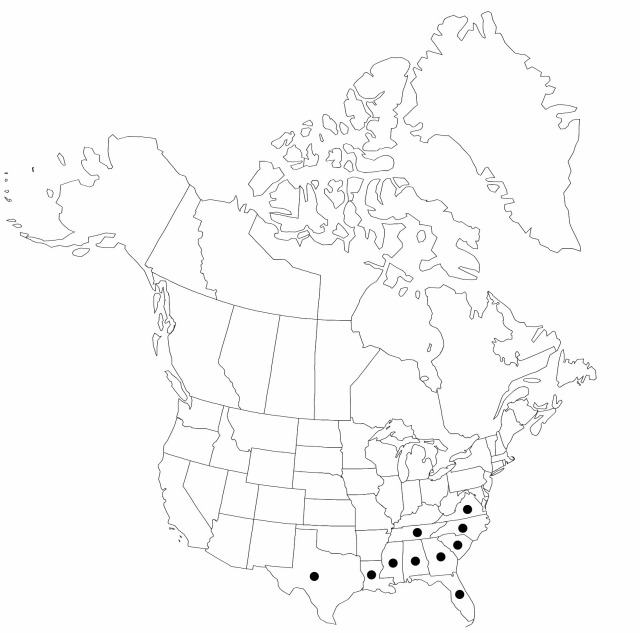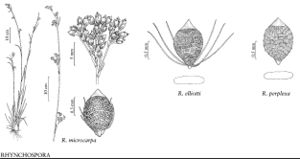Difference between revisions of "Rhynchospora perplexa"
in J. K. Small, Fl. S.E. U.S., 197, 1328. 1903.
FNA>Volume Importer |
imported>Volume Importer |
||
| (5 intermediate revisions by 2 users not shown) | |||
| Line 1: | Line 1: | ||
{{Treatment/ID | {{Treatment/ID | ||
|accepted_name=Rhynchospora perplexa | |accepted_name=Rhynchospora perplexa | ||
| − | |accepted_authority=Britton | + | |accepted_authority=Britton |
|publications={{Treatment/Publication | |publications={{Treatment/Publication | ||
|title=in J. K. Small, Fl. S.E. U.S., | |title=in J. K. Small, Fl. S.E. U.S., | ||
|place=197, 1328. 1903 | |place=197, 1328. 1903 | ||
|year=1903 | |year=1903 | ||
| + | }} | ||
| + | |special_status={{Treatment/ID/Special_status | ||
| + | |code=F | ||
| + | |label=Illustrated | ||
}} | }} | ||
|basionyms= | |basionyms= | ||
| Line 11: | Line 15: | ||
|name=Phaeocephalum perplexum | |name=Phaeocephalum perplexum | ||
|authority=(Britton) House | |authority=(Britton) House | ||
| + | |rank=species | ||
}} | }} | ||
|hierarchy=Cyperaceae;Rhynchospora;Rhynchospora perplexa | |hierarchy=Cyperaceae;Rhynchospora;Rhynchospora perplexa | ||
| Line 35: | Line 40: | ||
-->{{#Taxon: | -->{{#Taxon: | ||
name=Rhynchospora perplexa | name=Rhynchospora perplexa | ||
| − | + | |authority=Britton | |
| − | |authority=Britton | ||
|rank=species | |rank=species | ||
|parent rank=genus | |parent rank=genus | ||
| Line 49: | Line 53: | ||
|publication title=in J. K. Small, Fl. S.E. U.S., | |publication title=in J. K. Small, Fl. S.E. U.S., | ||
|publication year=1903 | |publication year=1903 | ||
| − | |special status= | + | |special status=Illustrated |
| − | |source xml=https:// | + | |source xml=https://bitbucket.org/aafc-mbb/fna-data-curation/src/2e0870ddd59836b60bcf96646a41e87ea5a5943a/coarse_grained_fna_xml/V23/V23_405.xml |
|genus=Rhynchospora | |genus=Rhynchospora | ||
|species=Rhynchospora perplexa | |species=Rhynchospora perplexa | ||
Latest revision as of 20:40, 5 November 2020
Plants perennial, cespitose, 50–110 cm; rhizomes absent. Culms lax, often excurved, slender, ± terete or trigonous. Leaves ascending, exceeded by culm; blades linear, proximally flat, 1.5–2.5 mm wide, apex trigonous, subulate, tapering. Inflorescences: clusters 3–4, widely spaced, narrowly, compactly, or diffusely turbinate; leafy bracts exceeding proximal clusters. Spikelets deep redbrown, ovoid to broadly ellipsoid, 2–3 mm, apex acute to acuminate; fertile scales broadly elliptic to obovate or orbiculate, 1.4–2(–2.5) mm, apex rounded to notched, midrib shortexcurrent. Flowers: perianth bristles 0–3, vestigial when present. Fruits 2–4 per spikelet, 1.5 mm; body pale brown to brown, strongly flattened, orbicular to broadly obovoid, 1–1.3 × 0.9–1.2 mm, surfaces sharply transversely wavyrugose, intervals finely vertically striate with rows of linearrectangular alveolae; tubercle depressed, triangular, flattened, 0.2–0.3 mm, base lunate.
Phenology: Fruiting late spring–fall or all year (south).
Habitat: Sands and peats of pond and lakeshores, depressions in savannas and flatwoods, or seeps
Elevation: 0–400 m
Distribution

Ala., Fla., Ga., La., Miss., N.C., S.C., Tenn., Tex., Va., West Indies (Cuba, Dominican Republic), Central America.
Discussion
In habit and in shape, size, and color of spikelet, Rhynchospora perplexa strongly resembles R. microcarpa, a species with which it is commonly associated in the Coastal Plain. An examination of the fruit shows those of R. perplexa to be flattened, with fewer and much coarser transverse ridges, the intervals with very narrow vertical alveolae. The perianth in most instances is absent or rudimentary. Fruit of R. microcarpa is biconvex with more transverse ridges (eight or more), the intervals more coarsely alveolate; its perianth bristles are six, evident, extending at least halfway up the fruit body.
Selected References
None.
